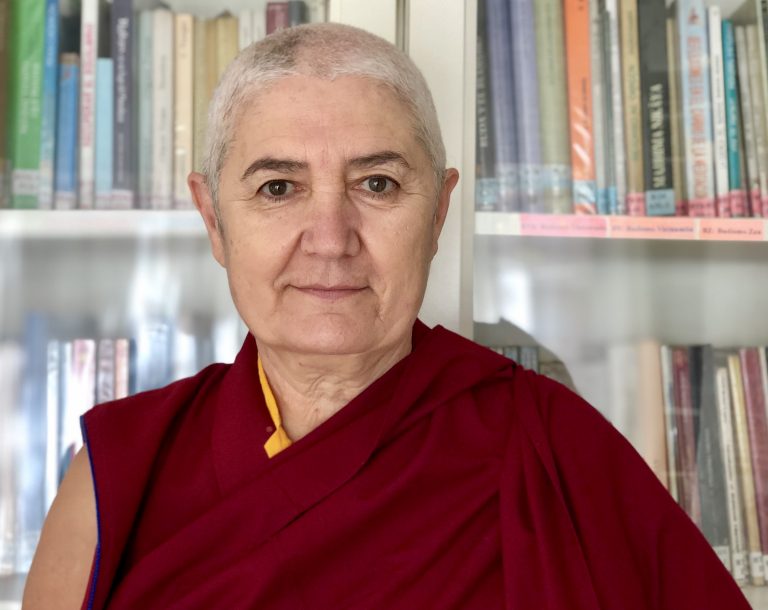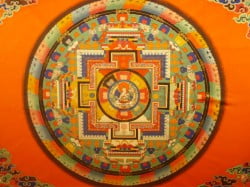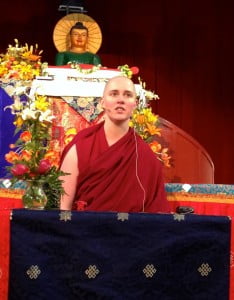By Catherine Clancy for Mandala Magazine in 1996, updated for the IMI Newsletter 2018 by Ven. Tendar.
Ven. Paloma is a Sangha Senior Council member for the IMI, but has many other roles within the FPMT mandala as well. Among others she is Spiritual Program Coordinator and introductory teacher in two FPMT centres: Nagarjuna Center Valencia and Nagarjuna Alicante, Spain. An FPMT registered teacher, she also teaches sometimes in Latin America, she is Regional Coordinator for Latin America too, and foremost of all she tries to be in the presence of Lama Zopa Rinpoche when he is in Europe and also bigger retreats the USA or Asia if possible.
Ven. Paloma is a slight person with a quiet voice and gentle attitude. Her tremendous energy and determination shine out from her bright, strikingly dark eyes. Since she became a nun, 32 years ago, her life has changed radically. From a young nurse working in a hospital in Valencia, she has been one of the key figures in the service of the FPMT in Spain, having been Director of different Centers in Spain, among them Osel Ling for nearly 14 years, and having also served the centres in Madrid, Barcelona, Valencia, Alicante and helped build up the centers.
She became interested in Buddhism in her late twenties, at a time when she was actively looking for different ideological approaches to the problems of society. She had spent some years of uneasiness searching for methods for improving the general situation in Spain, during which she tried out the alternatives of atheism and various political philosophies. She also developed a strong interest in psychology and psychiatry. “I realized early on that the starting point to personal transformation and the only way to help other people was to work on yourself first.” On a trip to Morocco, one of her many travels, she discovered a key to people’s character: “I was surprised by the hospitality and kindness of the people there. I realized then that it had something to do with religion and
started looking.”
Ven Paloma interpreting into Spanish aided by her furry sidekick Teddy Tulku
It was another trip which brought her face to face with the teachings of Buddhism. Taking a break from the hospital where she was working as a psychiatric nurse, she decided to go cycling round the small island of Ibiza, in the Balearics. A simple poster announcing a session of teaching by a lama caught her eye. “I thought – how strange. What’s a lama doing here, of all places!” Her curiosity was kindled and she went along. Her immediate impression was not positive: “All those strange, exotic-looking people, each wearing a different style of clothes just like a disguise.”
But her skepticism disappeared in a matter of days, dissolving into an aura of calmness and well-being as she discovered that, beneath the unusual appearances, everyone had the same interests at heart. She decided to investigate further, and has never looked back.
And the decision to become a nun? With her characteristic decisiveness, Paloma went to India, two years after that important trip to Ibiza, to study and found herself under the teaching guidance of Lama Zopa Rinpoche. “Meeting my master is the most important and the most wonderful thing that has ever happened to me.” Her eyes glow with appreciation and warm sincerity. “Somehow, it all seemed so natural at the time – a culmination of many things.”
In 1986 before returning back to the west, raised the question of becoming a nun. “I felt very strongly that the best use of my time would be to work towards the benefit of others, and I was clear that I wanted to dedicate my energy to the activities of Lama Zopa. So, I asked him for guidance.”
When it came, the decision couldn’t have been clearer. “I went to Lama Zopa with an open mind, ready to accept a yes or a no.” When Paloma describes Rinpoche’s answer her eyes open wide and she breaks into a huge smile. “He said, ‘Very beneficial for ALL sentient beings.’ When he said ‘ALL’ it was such a huge word that the room couldn’t contain it. I suddenly felt so small – I hadn’t thought about all beings, I’d just thought, mainly, about me, only me.”
This was a turning point, a moment when all the complications and confusions of daily life dropped away, allowing her to concentrate wholeheartedly on her work without distractions. She speaks of the months leading up to this decision as a time of great anxiety, fraught with uncertainties. Her main preoccupation was the difference between leading a Buddhist life in the Orient or in the West. “I was not really too worried about living in the West – I always knew my place was here – but I did
wonder what it would be like living here as a nun.”
Having inhaled the magical ambience of India, cocooned by so many others with similar interests, she found the idea of returning to the normality of Spanish life unsettling. There is, she stresses, a vast gap between the two styles of life, one that you have to be mentally prepared to handle.
“There’s no sense of rejection at all,” she assures, “but one of the hardest things about having chosen this particular mode of life is that there are so few people to share it with. In the Eastern countries you find more understanding and acceptance of people around you. Here you are an exception, and you can’t go by unnoticed. You need to be flexible in order to adapt to the surroundings of a bustling city. You really need the courage of your convictions.”
The small Valencia community of a lama, one nun and a hard working lay couple (they also function as director and translator) is a long way from the multitudinous gatherings of Buddhists in India. However, there is a sense of tranquility inside, although it is by no means inactive. Ven. Paloma and her two colleagues work hard to organize the activities of the center – weekend meetings, meditation, teachings, rituals. At least once a month there is a three-day teaching session given by Geshe-la or by visiting teachers from Spain or abroad.
Through her constant movement around Spain, Ven. Paloma knows the Spanish centers well. “Each has its own distinctive nature, partly because of the different character of the surroundings.” She remembers working hardest at Osel Ling retreat center in the mountains near Granada, where she was director for four years. After that she spent three years in Madrid as spiritual coordinator and then moved to the center in Valencia, her home city, then to Barcelona for about three years, again Osel Ling for about ten eyars being director and returning to Valencia, initiatlly to take care of her mother.
Paloma’s work is intense and relentless: how does she keep her energy charged and her spirits high? “The main strength is to be at one with yourself, and to have the teachings very present in your mind. That way you keep your direction very clear. The most important thing that helps me is to remember the teachings of my guru. It is also fundamental to be able to go on retreat at least once a year – although occasionally there’s been too much to do and I’ve missed out a year here or there.”
Paloma is optimistic about the place of Buddhism in Spain. “The emphasis of education has changed here a great deal in the last few decades, and this is important to the future of Buddhism. Thirty years ago, all school teaching was based on strictly Catholic grounds, and no other religion was
introduced into the curriculum. Today education is not so restricted, and children are taught about a variety of religions – this means that people are better informed about the existence of other ways of thinking nowadays.” It’s better, but perhaps still not good enough.
“When I was 12, I wanted to be a missionary, but so did all Spanish children then.” With the change in focus away from a dominant Catholic education, however, a spiritual void has opened. “There is an even stronger need for some sort of spirituality. Buddhism can fill that chasm well, particularly here in Spain where the modern attitude to religion is very anti-dogmatic. People need the encouragement to value their own personal criteria, and to appreciate that individual well-being is
completely linked to their surroundings and the well-being of everybody else. This way of thinking fits well with the needs of Western society.”
“What has been your greatest challence in your ordained life?” “I have to think, maybe the fact that service is also Dharma practice, but actually I got it quite soon. When you offer service you give up own ideas and so called needs, there is not much time for the ‘I’ to follow it’s own -often negative- imprints. I always stay in touch with the Dharma, often listening to teachings and while working. You have to be strong; as difficult emotions like feeling lonely can come up, but I always feel very connected to the sangha. Visiting His Holiness the Dalai Lama’s and Lama Zopa Rinpoche’s is very helpful, a big blessing and strengthens to be connected with my sisters and brothers”.
“What advice would you have for those considering ordination?” ‘’On one hand hand think well and prepare well, on the other hand, once you really have the inspiration and the wish to be ordained it is well rooted, then when the conditions come together we have to make the step, as it is not sure if we wait too much, the opportunity will come again. Follow always the advice of the guru’’
It is precious to be able to lead the life of a monk or nun, but you have to be prepared. It is also very important, take care to have a very good teacher, as we need a connection with a guru like for me Lama Zopa Rinpoche.
In 1996, Paloma’s dream was to set up a monastery for the nuns of Spain – there are a dozen at the moment – in a quiet spot in the countryside. She has longed for the tranquility and spiritual unity of this since her sojourn in India. “It is a dream of mine, very difficult to fulfill, but something I would really love to happen.” Has that changed in 2018? “I am still open for the idea, but found that most of all my life is meaningful if I just follow the advice of Lama Zopa Rinpoche, wherever it brings me”.
Meanwhile, she continues to be in service and tried to meet the needs of students of the two FPMT Nagarjuna centres in Valencia and Alicante, to be of help to whoever comes by, Buddhist or not.






